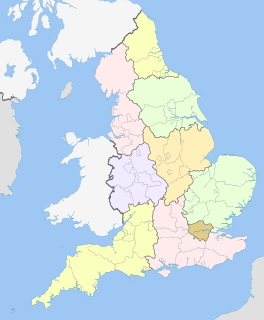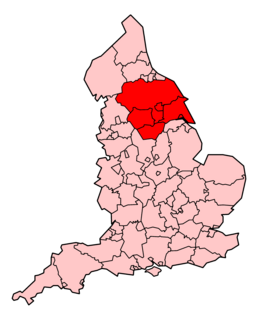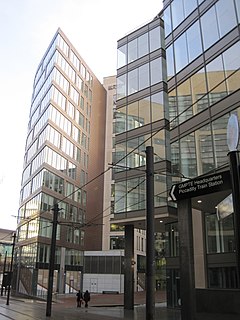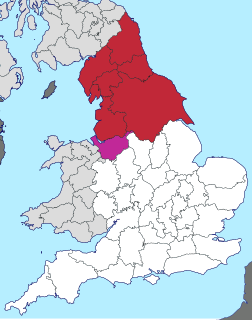
Yorkshire, formally known as the County of York, is a historic county of Northern England and the largest in the United Kingdom. Because of its great size in comparison with other English counties, functions have been undertaken over time by its subdivisions, which have also been subject to periodic reform. Throughout these changes, Yorkshire has continued to be recognised as a geographic territory and cultural region. The name is familiar and well understood across the United Kingdom and is in common use in the media and the military, and also features in the titles of current areas of civil administration such as North Yorkshire, South Yorkshire, West Yorkshire and the East Riding of Yorkshire.

Yorkshire and the Humber is one of nine official regions of England at the first level of ITL for statistical purposes. The population in 2011 was 5,284,000 with its largest settlements being Leeds, Sheffield, Bradford, Hull, and York.

Kingston upon Hull, usually abbreviated to Hull, is a port city and unitary authority in the East Riding of Yorkshire, England. It lies upon the River Hull at its confluence with the Humber Estuary, 25 miles (40 km) inland from the North Sea, 50 miles (80 km) east of Leeds, 34 miles (55 km) south-east of York and 54 miles (87 km) north-east of Sheffield. With a population of 259,778 (mid-2019 est.), Hull is the fourth-largest city in the Yorkshire and the Humber region.

Humberside was a non-metropolitan and ceremonial county in Northern England from 1 April 1974 until 1 April 1996. It was composed of land from either side of the Humber Estuary, created from portions of the East Riding of Yorkshire, West Riding of Yorkshire, and the northern part of Lindsey, Lincolnshire. The county council's headquarters was County Hall at Beverley, inherited from East Riding County Council. Its largest settlement and only city was Kingston upon Hull. Other notable towns included Goole, Beverley, Scunthorpe, Grimsby, Cleethorpes and Bridlington. The county stretched from Wold Newton in its northern tip to a different Wold Newton at its most southern point.

Northern England, also known as the North of England or simply the North, is the most northern area of England. It is split into three statistical regions: the North East, the North West, and Yorkshire and the Humber. These regions have a combined population of approximately 14.9 million as of the 2011 census, spread over an area of 37,331 km2, containing 17 of the 69 UK cities. Northern England is culturally and economically distinct from both the Midlands and the South of England. The latter distinction is sometimes referred to as the North–South divide.

In the United Kingdom, regional development agencies (RDAs) were nine non-departmental public bodies established for the purpose of development, primarily economic, of England's Government Office regions between 1998 and 2010. There was one RDA for each of the NUTS level 1 regions of England. Similar activities were carried out in Wales by the Welsh Government Department of Economy and Transport, in Northern Ireland by the Department of Enterprise, Trade and Investment and in Scotland by Scottish Enterprise and Highlands and Islands Enterprise.
Following a review of the film infrastructure in England during 2000, the UK Film Council set up nine Regional Screen Agencies, one in each of the regions of England, to deliver support for film-making, exhibition and related media activities. The regional screen agency network was closed down in 2011, with a number of services consolidated into a new agency, Creative England, and the majority of screen agencies then folded. However, a few continued to operate, most notably Film London and Screen Yorkshire.

The economy of Leeds is the most diverse economy of all the UK's main employment centres and has seen the fastest rate of private-sector jobs growth of any UK city and has the highest ratio of public to private sector jobs of all the UK's Core Cities. Leeds has the third-largest jobs total by local authority area with 480,000 in employment and self-employment at the beginning of 2015. Leeds is the largest legal and financial centre in England outside of London, and third largest in the UK after Edinburgh, and in 2011 its financial and insurance services industry was worth £2.1 billion. with more than 30 national and international banks located in the city. Leeds is also the UK's third largest manufacturing centre with around 1,800 firms and 39,000 employees, Leeds manufacturing firms account for 8.8% of total employment in the city. The largest sub-sectors are engineering, printing and publishing, food and drink, chemicals and medical technology. Leeds is also ranked as a gamma world city by the Globalization and World Cities Research Network; Over the next ten years, the economy is forecast to grow by 25% with financial and business services set to generate over half of GVA growth over that period with Finance and business services accounting for 38% of total output. Other key sectors include retail, leisure and the visitor economy, construction, manufacturing and the creative and digital industries.

The Yorkshire Ambulance Service NHS Trust (YAS) is the NHS ambulance service covering most of Yorkshire in England. It is one of ten NHS Ambulance Trusts providing England with emergency medical services as part of the National Health Service it receives direct government funding for its role.

Yorkshire Forward was the regional development agency (RDA) for the Yorkshire and the Humber region of the United Kingdom. It supported the development of business in the region by encouraging public and private investment in education, skills, environment and infrastructure. It was abolished on 31 March 2012 following the public spending review announced in 2010.

Scouting in Yorkshire and the Humber is largely represented by the Scout Association of the United Kingdom and some Groups of traditional Scouting including the Baden-Powell Scouts' Association.
The North of England Inward Investment Agency is a UK government sponsored agency that represents two regional development agencies (RDAs) in North England: Northwest Regional Development Agency (NWDA), One NorthEast (ONE) and Yorkshire Forward (YF). NoE’s primary function is to work as an ambassador to businesses and therefore attract targeted inward investment to the North of England region.

The Leeds City Region is a city region located in Yorkshire, England. It is mainly located in West Yorkshire, but also covers parts of South and North Yorkshire. According to the Office for National Statistics, as of 2017 the city region ranked 2nd behind Greater London for both population and GVA in the United Kingdom. It has a population of 3,063,074 million and a GVA of £69.62 billion.
In England, local enterprise partnerships (LEPs) are voluntary partnerships between local authorities and businesses, set up in 2011 by the Department for Business, Innovation and Skills to help determine local economic priorities and lead economic growth and job creation within the local area. They carry out some of the functions previously carried out by the regional development agencies which were abolished in March 2012. In certain areas, funding is received from the UK government via growth deals.

The South Yorkshire Mayoral Combined Authority is the combined authority for South Yorkshire in England, with powers over transport, economic development and regeneration. It covers a total area of 3484 km2 which is home to a population of 1.8 million. It includes the entirety of the metropolitan county of South Yorkshire. As well as the North East Derbyshire District, the Derbyshire Dales District, the Bassetlaw non-metropolitan District, Chesterfield non-metropolitan and the Bolsover non-metropolitan District as non-constituent members.

Northern Powerhouse Rail (NPR), sometimes referred to unofficially as High Speed 3, is a proposed major rail programme designed to substantially enhance the economic potential of the North of England. Featuring new and significantly upgraded railway lines, it aimed to transform rail services between the region's towns and cities. It would have been the region's single biggest transport investment since the Industrial Revolution. The original scheme would have seen a new High-speed rail line from Liverpool to Warrington continuing to join the HS2 tunnel which it would share into Manchester Piccadilly station. From there, the line would have continued to Leeds with a stop at Bradford. The line was intended to improve journey times and frequency between major Northern cities as well as creating more capacity for local service on lines that express services would have been moved out from.
The Northern Powerhouse is a proposal to boost economic growth in the North of England by the 2010–15 coalition government and 2015–2016 Conservative government in the United Kingdom, particularly in the "Core Cities" of Hull, Manchester, Liverpool, Leeds, Sheffield and Newcastle. The proposal is based on the benefits of agglomeration and aims to reposition the British economy away from London and the South East. The spatial footprint of the Northern Powerhouse is defined as the 11 Local enterprise partnership areas of the North of England.

Transport for the North (TfN) is the first statutory sub-national transport body in the United Kingdom. It was formed in 2018 to make the case for strategic transport improvements across the North of England. Creating this body represented an unprecedented devolution of power from Central Government. TfN brings together the North's twenty local transport authorities and business leaders together with Network Rail, National Highways, and HS2 and works with the UK Government. The organisation has offices in Manchester and Leeds.

Northern England devolution is the broad term used to describe the wish for devolved governmental powers that would give more autonomy to the Northern Counties.














